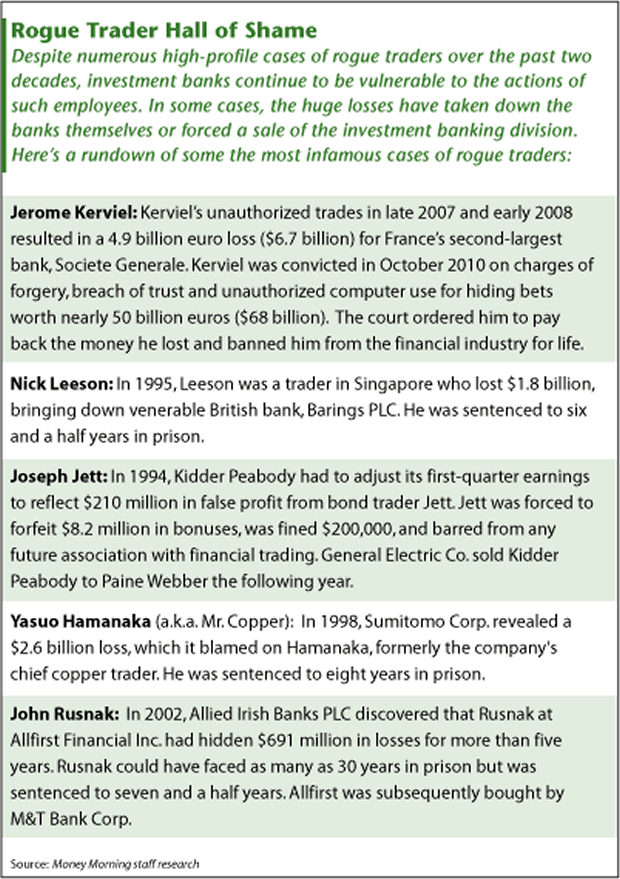Rogue Trader Costs UBS $2 Billion, Stock Price Plunges 11%
Companies / Banking Stocks Sep 16, 2011 - 06:35 AM GMTBy: Money_Morning
 David Zeiler writes:
A rogue trader at UBS AG (NYSE ADR: UBS) lost $2 billion on a series of unauthorized transactions, the bank disclosed yesterday (Thursday) despite internal risk controls designed to prevent such activity.
David Zeiler writes:
A rogue trader at UBS AG (NYSE ADR: UBS) lost $2 billion on a series of unauthorized transactions, the bank disclosed yesterday (Thursday) despite internal risk controls designed to prevent such activity.
An employee of the London UBS desk that trades exchange-traded funds (ETFs), 31-year-old Kweku Adoboli, was arrested yesterday on suspicion of fraud.
"This is a frightening level of wrongdoing in a bank that was held up as the world class example of good risk management before the [2008 financial] crisis," Chris Roebuck, a former UBS employee and a current visiting professor at Cass Business School, wrote in on efinancialnews.com.
The company's stock fell 11% on the news.
UBS warned that its third quarter probably would be unprofitable, although analysts say the bank - Switzerland's largest - should be able to absorb the loss. Previously UBS had forecast a profit of $1.5 billion for the third quarter.
The UBS rogue trader revelation is just the latest blow to its finances and its reputation. From 2006 through 2009, the UBS investment bank division recorded $65 billion in losses, from which the bank had only recently recovered.
"How many times do we have to see huge UBS losses?" Simon Maughan, head of sales and distribution at MF Global Ltd. in London told Businessweek. "It looks unreformed, unwieldy and ultimately unsustainable. This could be a critical tipping point for UBS's strategy."
Some speculated that the incident could tarnish other UBS divisions.
"The key area of damage in our view is reputational and extends beyond the investment bank, into UBS's private banking business," Goldman Sachs (NYSE: GS) said in a note to clients.
Rogues Gallery
The incident also brought to mind other rogue traders of the past two decades, including Jerome Kerviel, who cost French bank Societe Generale (PINK: SCGLY) $6.7 billion in 2008, and Nick Leeson, whose $1.8 billion in losses in 1995 brought down the British Barings Bank PLC.
With so many previous examples serving as a warning, not to mention its own recent history of trouble, many wondered how such a thing could have happened at UBS.
"No rogue trader works in a vacuum, and UBS's management must have taken its eye off the ball to allow a trader to operate on this scale without sufficient supervision and without the systems to monitor his trades," Simon Morris, a partner at UK law firm CMS Cameron McKenna told Reuters.
Consequences of the UBS rogue trader could extend well beyond its impact on that bank.
By coincidence, the Swiss parliament had scheduled a debate on the country's banking industry with an eye toward more regulation, and possibly forcing the two largest banks - UBS and Credit Suisse Group AG (NYSE ADR: CS) to split off their investment arms to avoid a total collapse of the financial institutions.

Swiss lawmakers also are considering changes that would increase capital requirements for both big banks to 19% of assets.
It's in Their DNA
That such incidents continue to happen raises questions about whether anything can be done to prevent them.
When Societe Generale's Kerviel was in the news, Money Morning Chief Investment Strategist Keith Fitz-Gerald predicted more regulation would not deter rogue traders in the future.
"Despite the fact that the world is now clamoring for more oversight and controls, we suggest that no amount of regulation will help," Fitz-Gerald wrote.
For their part most of the rogue traders appear to believe they're simply doing what is expected of them - earning profits for their company.
"I thought it was incredible that no one came to talk to me about this," Kerviel told a court-appointed psychologist at the time. "My positions made money, so I told myself that it legitimized what I was doing."
With pressure to juice profits creating such overwhelming incentives to break rules both internal and external, the UBS rogue trader really should have surprised no one.
"Clever traders will always find ways to game the system," Fitz-Gerald observed. "Their supervisors will unwittingly encourage this behavior by maintaining the outrageous bonus structures and payouts for which Wall Street is now synonymous."
Source : http://moneymorning.com/2011/09/16/rogue-trader-costs-ubs-2-billion-sends-stock-skidding-11/
Money Morning/The Money Map Report
©2011 Monument Street Publishing. All Rights Reserved. Protected by copyright laws of the United States and international treaties. Any reproduction, copying, or redistribution (electronic or otherwise, including on the world wide web), of content from this website, in whole or in part, is strictly prohibited without the express written permission of Monument Street Publishing. 105 West Monument Street, Baltimore MD 21201, Email: customerservice@moneymorning.com
Disclaimer: Nothing published by Money Morning should be considered personalized investment advice. Although our employees may answer your general customer service questions, they are not licensed under securities laws to address your particular investment situation. No communication by our employees to you should be deemed as personalized investent advice. We expressly forbid our writers from having a financial interest in any security recommended to our readers. All of our employees and agents must wait 24 hours after on-line publication, or 72 hours after the mailing of printed-only publication prior to following an initial recommendation. Any investments recommended by Money Morning should be made only after consulting with your investment advisor and only after reviewing the prospectus or financial statements of the company.
Money Morning Archive |
© 2005-2022 http://www.MarketOracle.co.uk - The Market Oracle is a FREE Daily Financial Markets Analysis & Forecasting online publication.



